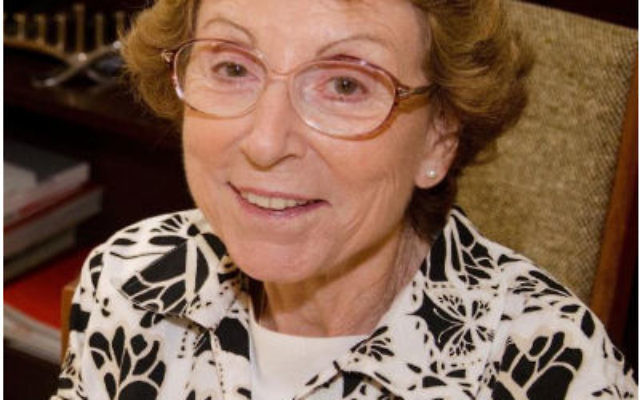That Morning When Nazis Came Knocking
By Rebecca McCarthy
It has been close to 80 years since the Gestapo showed up at the Sachs family apartment in Koenigsberg, East Prussia. But Dorothy Sachs Sparer remembers that Nov. 8 morning in 1938 as if it were yesterday.
She shared her memories recently at Athens’ Children of Israel Congregation as part of a weekly Havdalah program.
She can’t forget the sound of people pounding and kicking on the front door. Someone shouting, “Aufmachen!” Soldiers rushing inside to take away her father, a renowned physician who ran his own clinic and taught at the university but months before had lost his position and most of his patients.
A soldier stood next to her father as he tied his shoes, and Dorothy believed the solider looked embarrassed. Just 6, she believed what her mother said: Her father had been taken to Berlin.
The soldiers took her father to prison, along with the city’s other Jewish men. The soldiers beat the rabbi but no one else. The next night was Kristallnacht, the Night of Broken Glass, when Jewish businesses, homes and synagogues throughout Germany were damaged and destroyed and innocent people were beaten, jailed, sent to concentration camps or killed.
When Dorothy’s mother visited her father in prison a few days after he was taken away, he told her that he and the other men had been forced to clean up the remains of the city’s beautiful Jewish synagogue, burned by the Nazis.
The Nazis soon released the doctor and the other prisoners, some of whom made plans to leave Koenigsberg.
It had been hard for Dorothy’s father to accept the events of the previous years, much less his jailing. Books by Jewish authors had been burned. Jews had been forbidden to work in film, theater, music or fine arts, and their citizenship was revoked. All Jewish people had to have new ID cards.
Dorothy’s paternal ancestors had been in Koenigsberg since the 17th century, and her father had fought for Germany in World War I, earning an Iron Cross. The doctor was well regarded by Jews and gentiles alike in the city.
Like many people, the doctor thought Hitler “was a joke, a clown,” Dorothy said. Of course, he was wrong.
The family’s car was gone. Their money was frozen. Dorothy’s mother finally convinced her father it was time to leave Germany.
The family petitioned to come to America, but Congress had established a quota to accept only 95 people out of 40,428 applications for asylum. In 1938, Dorothy said, 83 percent of Americans opposed immigration, and there were pro-Nazi rallies all over America.
The Sachses learned there was refuge in London, where they would be allowed to remain for one year.
German soldiers came to watch them pack, making sure they didn’t take anything of worth. Dorothy’s mother got a soldier tipsy on schnapps and sat on his lap, singing German folks songs, while her father packed a camera and other valuables.
Two months after the Sachs family settled in London in 1939, Germany invaded Poland and started World War II. The borders were closed, and no one was allowed to leave Germany.
Along with other children in London, Dorothy was evacuated to the countryside. She spent a year in North Hampton with a local couple and learned to speak Cockney English.
A medical school friend in Kansas City helped Dorothy and her family get the documents they needed to come to America. After a five-day ocean voyage, they reached New York Harbor in 1940. When they saw the Statue of Liberty, everyone who knew it burst into “The Star-Spangled Banner.”
The family settled in Brooklyn. Years later, Dorothy earned a master’s in magazine journalism from Syracuse, then married a city planner, had twins and moved to Athens.
If you visit her home, you’ll notice a sign on the front door: “Please ring bell. DO NOT KNOCK.”





comments